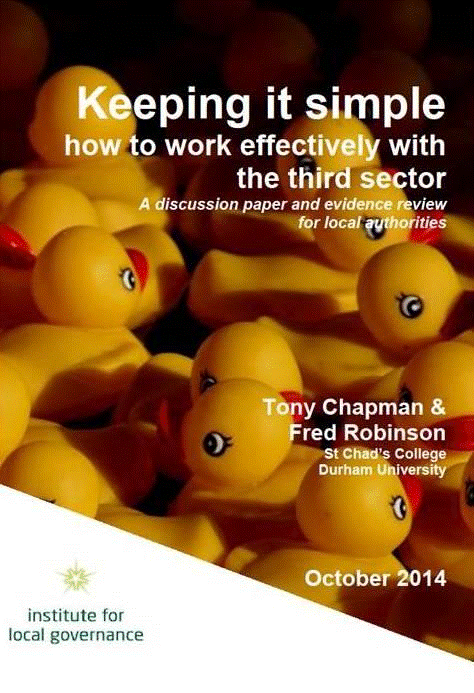 The Institute for Local Governance held a conference on 24th October 2014 to debate the findings from a major new report by Professors Tony Chapman and Fred Robinson on how councils can work effectively with the third sector (which includes charities, voluntary and community organisations, social enterprises and other non profit organisations with a social mission). The event, held at Teesside University’s campus in Darlington, was attended by representatives from all 12 councils in North East England, Cumbria and five councils from Yorkshire and Humber.
The Institute for Local Governance held a conference on 24th October 2014 to debate the findings from a major new report by Professors Tony Chapman and Fred Robinson on how councils can work effectively with the third sector (which includes charities, voluntary and community organisations, social enterprises and other non profit organisations with a social mission). The event, held at Teesside University’s campus in Darlington, was attended by representatives from all 12 councils in North East England, Cumbria and five councils from Yorkshire and Humber.
A panel of facilitators led discussions during the day including: Karen Bowen, Chief Executive, Cumbria Council for Voluntary Service; Gordon Elliott, Head of Partnerships and Community Engagement, Durham County Council; Fiona Ellis, Trust Manager, Millfield House Foundation and Board Member of Big Society Capital; Kirsten Francis, Principal Policy Officer, Transformation Group, Northumberland County Council; Lesley King, Head of Policy, Improvement and Engagement, Stockton Borough Council and Judy Robinson, Chief Executive, Involve Yorkshire & Humber. The conference was opened by Cath Whitehead, Deputy Chief Executive of Darlington Borough Council.
New ways of thinking about inter-sector relationships were debated at the event in order to help maximise the impact of public sector and third sector interactions. Evidence collected over several years demonstrates that most relationships between the sectors are well established, productive and relatively problem free. But within the public sector, relationships with the third sector are often thought about as being unnecessarily difficult and demanding. This often arises from the circulation of negative stories about interactions which, over time, start to give an impression that all interactions are potentially difficult. A series of discussions took place included:
- How, when and where to develop effective commissioning practices which successfully engage local third sector organisations in service design and delivery.
- How, when and where to invest in the local third sector successfully to improve sector representation, sector intelligence and develop organisational capability.
- How, when and where to invest in the third sector to develop local social growth agendas – and how best to understand (but not always necessarily measure) the impact of this investment.
The debates were then rounded up in a final panel session where practitioners and policy makers reflected on the key questions arising from discussions. A summary report is available here.
